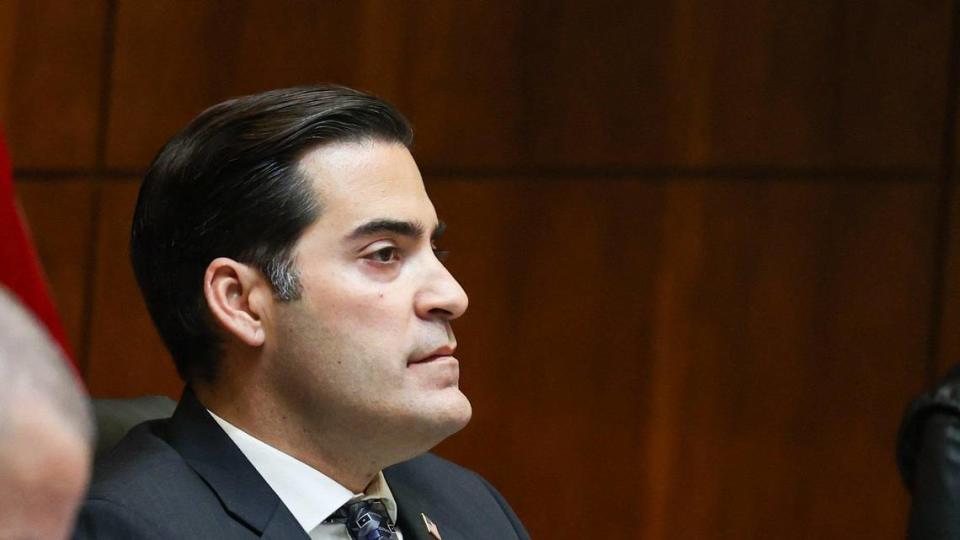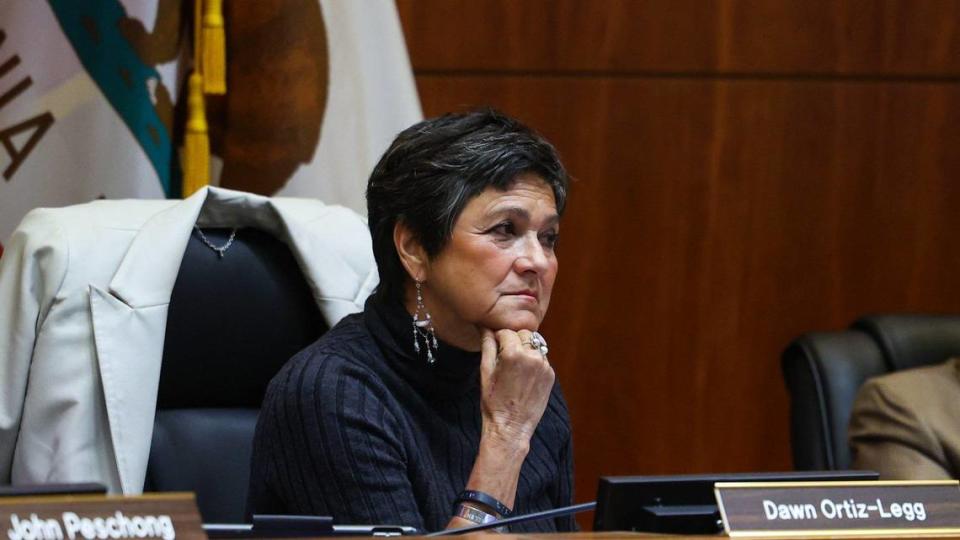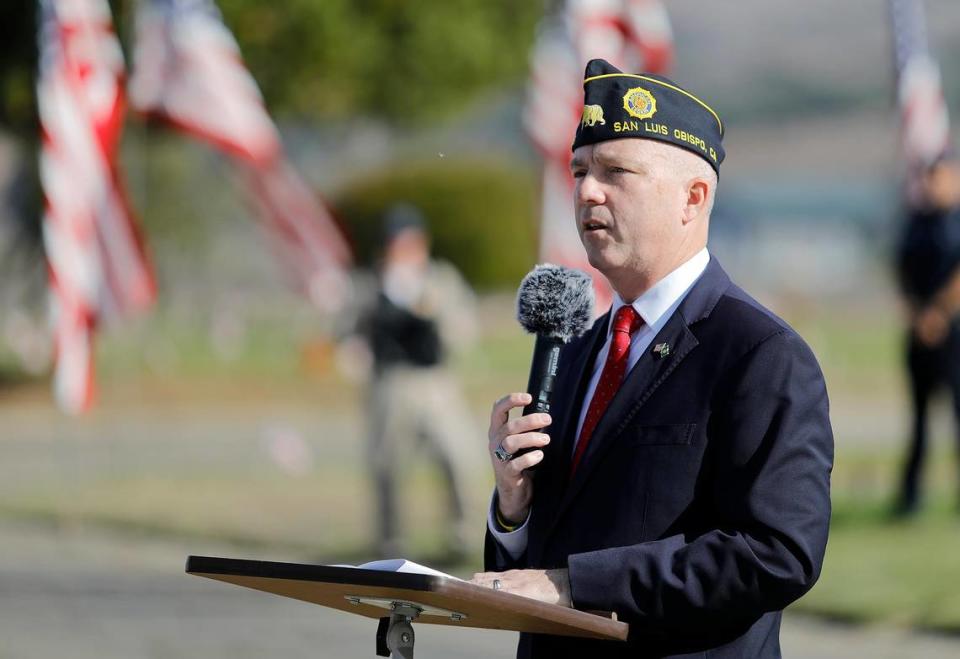SLO County supervisors lower campaign donation limit: ‘Get big money out of politics’
The San Luis Obispo County Board of Supervisors has lowered the cap on how much money an individual can donate to campaigns for county offices.
“I think we need to strive to get big money out of politics and reduce special interest influence,” Supervisor Jimmy Paulding said at Tuesday’s meeting. “We have a unique opportunity to do that now.”
In November 2020, the board voted 3-1 to set the cap for individual contributions at $25,000 after hundreds of residents urged the board to pick a lower limit.
On Tuesday, the new liberal board majority voted 3-2 to throw out the county’s $25,000 cap and default to the state’s $5,500 limit on individual donations.
The cap applies to 10 county offices, including the five Board of Supervisor seats, the sheriff and district attorney.

Why did supervisors limit individual donations to campaigns?
In November 2020, the county didn’t have a limit on how much an individual person, business or political action committee could donate to a campaign. Back then, donors could give unlimited amounts of money to their chosen candidate, according to Assistant County Counsel Jon Ansolabehere.
In 2019, the State Legislature passed AB 571, which at the time limited individual campaign donations to $4,700. The county had until the end of 2020 to set its own limit or default to the state’s limit, Ansolabehere said.
The state cap increases each year, and the limit is now set at $5,500 per individual donation, according to Ansolabehere.
The League of Women’s Voters’ Second Vice President Ed Cabrera urged the board to throw out the $25,000 cap and revert to the lower state limit.
Large donations “distort our political process and undermine fair representation (and) may contribute to public mistrust of government institutions and to voter apathy,” Cabrera said.
The League of Women Voters wants to shift the political spotlight away from how much money a candidate can raise, and instead highlight the candidate’s qualifications, Cabrera said.
“Reducing the influence of big money makes our elections fair,” Cabrera said. “Our elections should work so that everyday Americans can run for office, and every American can know that their elected officials are working for them and not for the people who financed their campaigns with large donations.”
Paulding agreed with Cabrera and voted in favor of the $5,500 limit. He said a lower cap could reduce the influence of large donors with special interests over local candidates.
“The average person doesn’t have $25,000 to write a check,” Paulding said.
A lower cap also could amplify the meaning of smaller donations made by the average citizen, Paulding said. He noted that when he ran for office in 2022, his average donation was less than $300 per individual.
“That’s representative democracy,” Paulding said.
Will limiting individual donations actually reduce money in local campaigns?
Some supervisors questioned if limiting individual donations would reduce funding funneled into local campaigns.
Ortiz-Legg voted to return to the state’s $5,500 cap but criticized the law’s limitations.
“Money in politics is what makes people get elected,” Ortiz-Legg said. “I think it’s completely short-sided to think bringing this down to $5,500 is going to take money out of politics.”
Candidates use donations to advertise their platform to voters, which is an expensive task, she said.
“Today’s voter is really hard to reach,” Ortiz-Legg said.
Incumbents can rely on name-recognition to reach voters. Challengers, however, need to spend more money to introduce themselves to the electorate, she said. Limiting individual donations could make it harder for challengers to defeat incumbents.
“It does take money to win seats,” she said.
Ortiz-Legg would have preferred that the county set its own $10,000 limit on individual donations, and she tasked a hearing officer with enforcement of the cap rather than the SLO County District Attorney’s Office to avoid conflict of interest, she said.

Supervisors Debbie Arnold and John Peschong preferred the $25,000 cap and voted against setting a lower limit.
According to Arnold and Peschong, limiting individual donations won’t reduce money spent on campaigning. It will simply change where donors spend their money.
Some political action committees must report their donors to the Fair Political Practices Commission. This includes general purpose committees, which receive contributions for political purposes such as donating to a candidate.
Independent expenditure committees, however, don’t have to report their donors — they only have to report what they spend money on. These committees form for political purposes but don’t donate directly to candidates or coordinate with candidates, according to the Fair Political Practices Commission.
When the county lowers the cap on individual donations, Arnold said she expects donors to “camouflage” their money by donating to independent expenditure committees instead.
“We’re making it less transparent,” Arnold said.
Peschong also expects donors to funnel more money into independent expenditure committees.
“I completely believe that there will be unlimited dark money in the races,” Peschong said.
Paulding explained that federal law regulates independent expenditure committees, not local or state law.
“We can’t do anything about that,” Paulding said. “But what we can do is we can address how much individual people, businesses, political action committees who live in this community can influence our local supervisors and elected officials.”
Gibson agreed.
“This is not going to solve the influence of money in campaigns unilaterally,” Gibson said. “But we have to step up.”
The supervisors did agree on one thing: Small donations are more common than large donations in SLO County campaigns.
Peschong noted that his average donation during his 2020 campaign was $74.
“These are grassroots offices, and these are grassroots-supported campaigns,” he said. “So if you have a $25,000 or $5,500 (cap), I don’t believe it really matters.”
“By that argument, our reversion to the state cap of $5,500 is going to have minimal effect on the funding of individual campaigns,” Gibson.
Who enforces the campaign finance cap?
Under the local limit, the SLO County District Attorney’s Office was responsible for enforcing the $25,000 cap, Ansolabehere said at the meeting.
Now that the county reverted to the state limit, the California Fair Political Practices Commission will enforce the cap.
Paulding said he preferred that enforcement was handed over to the commission to avoid conflict of interest.
“I just don’t think that somebody who has as much influence as they do in our community, has relationships with elected officials, should be responsible for that,” Paulding said.
Gibson went a step further and called District Attorney Dan Dow “notably partisan,” highlighting that the California Supreme Court ruled to remove the SLO County DA’s Office from prosecuting Tianna Arata and six other Black Lives Matter activists for charges they incurred at a 2020 protest.
Dow also donated $25,000 from his Dan Dow for District Attorney 2022 campaign account to Back the Badge, a political action committee that circulated advertisements labeling Gibson as “pro-crime” during the 2022 election.

Peschong defended Dow.
“I do not believe you can question Dan Dow’s integrity and honesty,” Peschong said. “They run a very tight ship there.”
Paulding noted, however, that Peschong may not trust the next district attorney, and that Fair Political Practices Commission enforcement prevents future conflict of interest.
“It could be a different district attorney in the future,” Paulding said. “That person could become partisan.”

